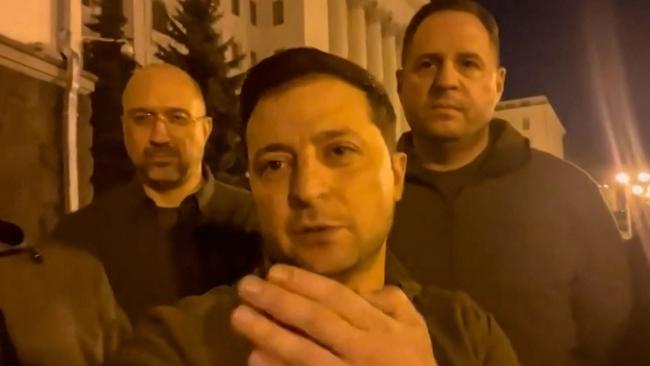
Decades of anti-American sentiment have led to the destabilisation of the free world order and the people of small democracies such as Ukraine are paying the price. The US is blamed for failing to halt Russia’s invasion, but the era of interventionist foreign policy is passing by.
The rise of the Russia-China alliance and the fragile state of Ukrainian democracy left it vulnerable to the voracious ego of Vladimir Putin.
Putin has dreamed of taking Ukraine to fulfil his romantic delusions of empire. Just as President Xi Jinping abolished term limits on his presidency, so has Putin changed the constitutional term limits on his rule.
On Friday, India joined China and the United Arab Emirates in refusing to condemn Russia for invading Ukraine. The three countries abstained from a vital United Nations Security Council resolution against Russian aggression. Russia had the power to veto the resolution as current president of the UNSC, but it revealed which states support it. Russia is recognised as a permanent member of the Security Council along with China, the US, the UK and France. As allies in World War II, the P5 was given the power of veto in the UNSC. However, there is discussion under way about whether Putin’s state could be challenged given the UN Charter recognised the USSR, not Russia, as a permanent member. The legality of the subsequent process to transfer P5 status to Russia is under question.
Megaphone diplomacy has done nothing to deter Russian aggression, or counter the rise of totalitarian China. And UN Secretary-General Antonio Guterres hardly inspired renewed confidence when he pleaded with Putin to stop the invasion. Guterres, the former president of the Socialist International, addressed Putin in the words of John Lennon and Yoko Ono’s Vietnam War anthem, “Give peace a chance”. He would do better to remember Lennon’s warning that peace is not something you wish for, it is something you make. If the UN really wants to stop Russian aggression, drop the megaphone and take meaningful action. Putin might have overplayed his hand in Ukraine, but sanctions are unlikely to deter him. The head of the Russian Orthodox Church has played a significant role in cultivating his impenetrable sense of self-belief, once describing Putin’s rule as a “miracle of God”. The miracle just happens to coincide with the Kremlin’s ambition to acquire foreign countries by force. When defending Russia’s decision to annex Crimea, Putin spoke about their shared history, harking back to the baptism of Vladimir I, a Christian convert born around 956AD.
He described Vladimir’s adoption of Orthodoxy as a “spiritual feat” that “predetermined the overall basis of the culture, civilisation and human values that unite the peoples of Russia, Ukraine and Belarus”. At least we know where Russia will go after the conquest of Ukraine.
Putin’s habit of cannibalising his neighbours is bad enough, but his posturing after the fact is amoral. For all his pretensions to being a Christian convert in a fallen world, the fact remains that Putin invaded Ukraine without just cause. He has terrorised the people, driven women and children from their homes, killed their kin and denied their right to self-determination as an independent sovereign state. This is no just war and Putin is no saint.
In the months before the invasion of Ukraine, the US warned Russia was preparing to attack. And in the days before Putin’s army advanced, cameras showed who his victims would be; old people in one of Europe’s poorest states unable to flee. This is a war waged by oligarchs against the poor. There is no honour in it.
As the death toll of Russia’s war mounted, young people braved the Kremlin by protesting in St Petersburg and Moscow. Russian security forces dragged them away. The Russian diaspora joined Ukrainians around the world to protest Putin’s brute force. They pleaded for the West to inflict more than sanctions on Russia, but saving Ukraine would require more than pushing Russian forces back home.
Ukrainian President Volodymyr Zelensky rode an anti-corruption ticket into office. Like many politicians who rise to power promising transparency and equality, he has been found wanting. In recent months, Zelensky has behaved in an unpredictable manner that has alarmed Western allies. Despite the US warning repeatedly since early December that Russian forces were preparing to invade Ukraine, Zelensky denied it. Throughout January, he was informed of US intelligence that Russia could invade within weeks. At the end of January, he held a press conference where he accused Western leaders of creating panic about invasion. The BBC described it as a “surreal encounter” during which he accused the media of creating panic too. Sadly, he was wrong. After Russia invaded he tried to stop Ukrainians fleeing by barring men aged between 18 and 60 from leaving.
Like any bully, Putin picks his targets. Ukraine was made vulnerable by years of official corruption so severe it destabilised government, bled the economy, weakened defence forces and discouraged NATO members from welcoming it into the fold. Its fall sends a message to democracies that they must choose a side in the coming cataclysm where Russia and China unite in a war against the free.




The world without America looks like tyrants smothering freedom one democracy at a time.